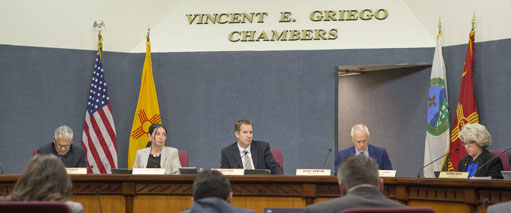Albuquerque City Councilors faced a couple of hundred folks at their Jan. 4 meeting. The meeting lasted more than five hours and topics tackled ranged from garbage to Woodhouse’s toads to getting a grip on an embarrassing backlog.Palabras PúblicasMany speakers passionately asked the Council to divest city money from banks that are supporting the Dakota Access Pipeline, specifically Wells Fargo and Bank of America. “You might think that DAPL is a thousand miles away but it is on our doorstep,” one speaker said. She may be right, as similar plans have been discussed for New Mexico. Civil rights attorney Michelle Lynn Cook, a member of the Navajo Nation and a founding member of the Water Protector Legal Collective greeted the Council in her native tongue. She went on to say that due to ongoing civil rights violations by some pipeline companies, the city should immediately withdraw all of its money from banks funding the inhumane treatment of the Standing Rock water protectors.Bring Back the WildlifeA number of people spoke in support of making use of the Candelaria Farm open space as a nature preserve. The 97-acre farm is adjacent to the Rio Grande Nature Center. Area eco-watcher Betsy James told the Council that for the last few years the land was managed by a local dairy farmer who was required to do sustainable organic agriculture. She also said that since a new interim farmer came on board, an herbicide was sprayed and there were no native Woodhouse’s toad tadpoles after this summer’s monsoons. She said a group of area residents have done a yearly count each summer and this is the first year with zero tadpoles. Under the new, Council-approved management plan, herbicides will be minimized and pesticides prohibited altogether. In addition, a board of stakeholders from public and private sectors will oversee the land use and management process.Trash MoneyThe controversial plan to build a 75,000-square foot solid waste transfer station at the intersection of Edith and Comanche will have to go through a $25,000 economic impact evaluation. A zone change request is pending with the city’s Environmental Planning Commission. Chief Operations Officer Michael Riordan said there was an economic feasibility study done back in 2014 where documentation showed the cost-benefit analysis. Mayor Richard Berry’s administration has been pushing for the transfer station because of the large amount of trash generated by city residents. Adding the station would allow unloading at an indoor, state-of-the-art station instead of at the faraway West Side landfill, therefore saving time and money by cutting out the long trips. Nearby residents object to the project saying that the 100 or so garbage trucks that are projected to do about 225 trips per day will damage their neighborhood and bring in smells, rats and vermin.Shameful Catch UpCouncilors approved a bill that will prioritize and begin to resolve the backlog of untested sexual assault kits. At last year’s Dec. 22 meeting, State Auditor Tim Keller told the Council the city had thousands of unprocessed sexual assault kits, and the number grows each day. He pointed out that the city’s police department did not have a plan nor the dollars to stay current, let alone catch up. Keller said it would take about $7 million to clear the backlog as each kit costs $1,000 to $1,500 each. This bill establishes a multi-jurisdiction board to outline a plan and a tracking process for clearing the backlog. The board will also look at establishing a scholarship, student loan pay-offs or other incentives to get students to enroll and complete forensics degree programs. Other initiatives include aggressively pursuing federal grants and legislative funding to assist in paying for the process of completing the tests. A separate bill is working its way to the Council table that will deal with how the police department can stay on top of new, incoming kits.Soccer DreamsCouncilor Dan Lewis sponsored a bill that puts aside $15,000 to see if building a 10,000 seat soccer/multipurpose stadium in the greater Downtown area would be feasible. The three potential locations for the stadium are the southwest corner of 12th Street and I-40, the Railyards, and Broadway and Lomas. Larry Espinoza and Ron Patel, are owners of Albuquerque Sol Football Club, a semi-pro soccer organization. They said their passion is soccer and they want to grow the community through the sport. Councilor Trudy Jones asked Patel, “Do you have any skin in the game?” Patel replied, saying his organization has invested hundreds of thousands of dollars to build up the semi-pro team over the last few years and is ready to take this next step—which he said could positively impact city coffers as well. The study was approved on a 6-2 vote with Councilor Klarissa Peña excused.Bridge HonorCouncilors approved a resolution naming the pedestrian bridge over Gibson, between Amherst and Carlisle, the Marshall Kovitz Overpass. Kovitz was a well-known bicycle enthusiast who rode his bicycle from Boston to Albuquerque in the 1970s. He was a strong supporter of the cooperative model and started a bike co-op at the corner of Girard and Central, helped develop the cooperative Harwood Art Center, was a founding member of the La Montañita food co-op and volunteered with the homeless at the Albuquerque Opportunity Center. He co-authored an online guide to Albuquerque’s bike trials. Kovitz died in April, 2016.PostponedNear the end of the meeting, Councilors postponed dealing with adopting a plan concerning vacant commercial buildings, three bills relating to the Albuquerque Bernalillo County Comprehensive Plan, funding more Albuquerque Police Department service aides and establishing a property crime reduction program.
Send your comments about the City Council to carolyn@alibi.com.The next meeting Wednesday, Jan. 18, 5pmCouncil Chambers in the basement of City HallView it on GOV TV 16 or at cabq.gov/govtv





